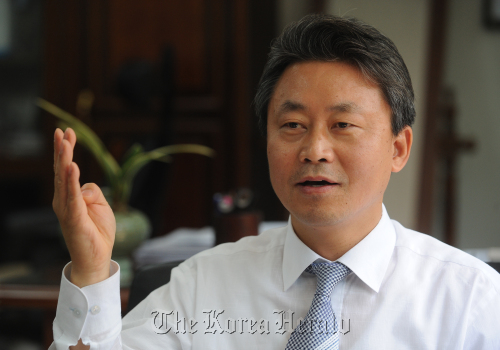[Herald Interview] Seoul shares bus network secrets with world cities
By 이지윤Published : June 20, 2011 - 19:08
Seoul’s eco-friendly bus policy is good inspiration for green efforts by major cities throughout the world, a ranking official of the city government said.
“Central governments talk a lot about climate change. But we in the cities are acting,” said Jeong Yon-chan, Seoul City’s assistant mayor of environmental protection headquarters, who attended the C40 Large Cities Climate Summit held in Sao Paulo on May 31 to June 2.
“The C40 summit has become an influential gathering on climate change, in which individual cities join forces to set binding goals and announce their specific action plans,” he said in a recent interview with The Korea Herald.
“Central governments talk a lot about climate change. But we in the cities are acting,” said Jeong Yon-chan, Seoul City’s assistant mayor of environmental protection headquarters, who attended the C40 Large Cities Climate Summit held in Sao Paulo on May 31 to June 2.
“The C40 summit has become an influential gathering on climate change, in which individual cities join forces to set binding goals and announce their specific action plans,” he said in a recent interview with The Korea Herald.

The C40 cities leadership group, founded in 2005, is a coalition of cities working to reduce urban carbon emissions and to adapt to climate change. Its chairman is New York City Mayor Michael Bloomberg. Seoul hosted the third summit in 2009.
According to the World Bank, C40 cities account for 8 percent of the global population, 12 percent of global greenhouse gas emission, and 21 percent of the world’s global gross domestic product.
Jeong also said he reconfirmed the importance of Seoul’s green efforts in the international community, describing it as the balance board in the center of a seesaw.
“Our experiences and achievements would encourage developing countries to come with their own action plans while continuing to inspire other advanced countries,” he said.
During the latest gathering in the Brazilian capital, city officials from around the world explained their efforts to slash carbon emissions ranging from changing street lights and insulating landmark buildings to promoting cycling.
Jeong, who has built his public service career mostly on transportation policy, delivered a special presentation about Seoul’s environment-friendly transportation system on behalf of Mayor Oh Se-hoon.
His speech attracted a lot of interest and positive response from participants, he said, especially those from Brazil, which is preparing for the 2014 World Cup and the 2016 Summer Olympics.
“The local media and government officials showed keen interest in the city’s policy. They wanted to learn from us who have similar development experiences,” he said.
In recent years, the city has worked to increase the efficiency of the transportation system.
The median bus-only lane, introduced in 1986, is now operated in 51 percent of bus lanes, or 100.4 kilometers, and will be expanded to 19 routes, or 215 kilometers, by 2015.
By improving the traffic signal system at crossroads, the average speed of buses has increased by 4 kilometers per hour. In a bid to encourage people’s use of public vehicles, the city has installed at bus stops such facilities as LCD monitors showing information such as bus arrival time and weather, and benches equipped with a temperature conditioning system.
In December last year, the city also launched the world’s first commercial electric bus service. Currently, a total of five buses are circulating Mount Nam in central Seoul, with 3,000 passengers using it every day.
“Electric vehicles and mobile phones are all about battery technology. It was very natural that Korea led the industry,” he said.
“Before reaching the full adoption, we have some issues to deal with, including the development of a high-speed battery charger. During the Sao Paulo summit, I proposed participating cities make global guidelines to support the industry,” he said.
The city’s convenient, advanced transportation system, along with the relatively cheaper transportation fees, makes citizens use bicycles less than other megacities.
“Unlike cities like Amsterdam, in Seoul the commuting distance between workplaces and houses is too long to use a bicycle and more than that, there are a lot of hills. But we will continue to promote bicycling as the means of leisure activities and transferring between buses and subway trains,” he said.
Thanks to recent efforts, the city now expects to improve its air quality to the level of Jeju Island, the nation’s southernmost island famous for its clean environment, by 2014.
The density of dust in the air was 62 micrograms per cubic meter in 2005 and 2006. Then, over the years of washing roads and adopting compressed natural gas buses, the average level dropped to 49 micrograms per cubic meter last year, near the 45 of Jeju.
The city has replaced its 99 percent diesel-fueled buses with CNG buses and established 45 stations for gas charge.
“Meeting the Jeju level may be an ambitious goal. But it’s not a mission impossible,” Jeong said. As part of the plan, the city will focus on the dust near school playgrounds and construction sites, while leaving it up to each of the 25 district offices to manage the general air quality.
By Lee Ji-yoon (jylee@heraldcorp.com)










![[Today’s K-pop] BTS pop-up event to come to Seoul](http://res.heraldm.com/phpwas/restmb_idxmake.php?idx=644&simg=/content/image/2024/04/17/20240417050734_0.jpg&u=)
![[Graphic News] More Koreans say they plan long-distance trips this year](http://res.heraldm.com/phpwas/restmb_idxmake.php?idx=644&simg=/content/image/2024/04/17/20240417050828_0.gif&u=)
![[KH Explains] Hyundai's full hybrid edge to pay off amid slow transition to pure EVs](http://res.heraldm.com/phpwas/restmb_idxmake.php?idx=644&simg=/content/image/2024/04/18/20240418050645_0.jpg&u=20240419100350)




![[KH Explains] Hyundai's full hybrid edge to pay off amid slow transition to pure EVs](http://res.heraldm.com/phpwas/restmb_idxmake.php?idx=652&simg=/content/image/2024/04/18/20240418050645_0.jpg&u=20240419100350)

